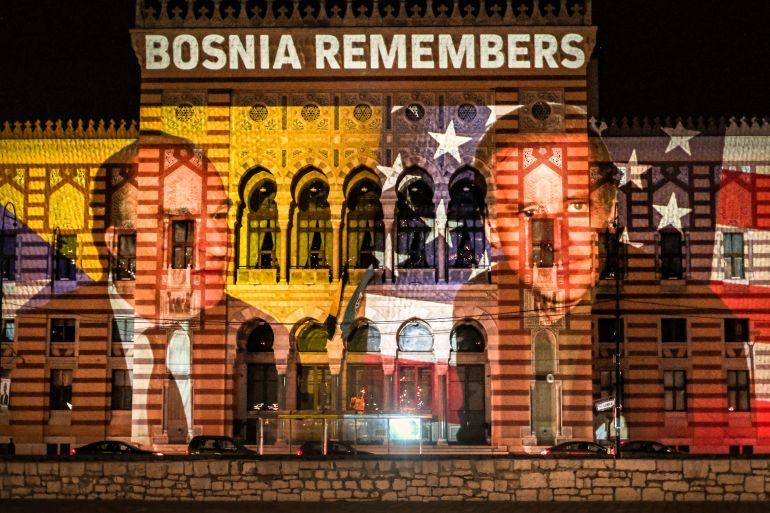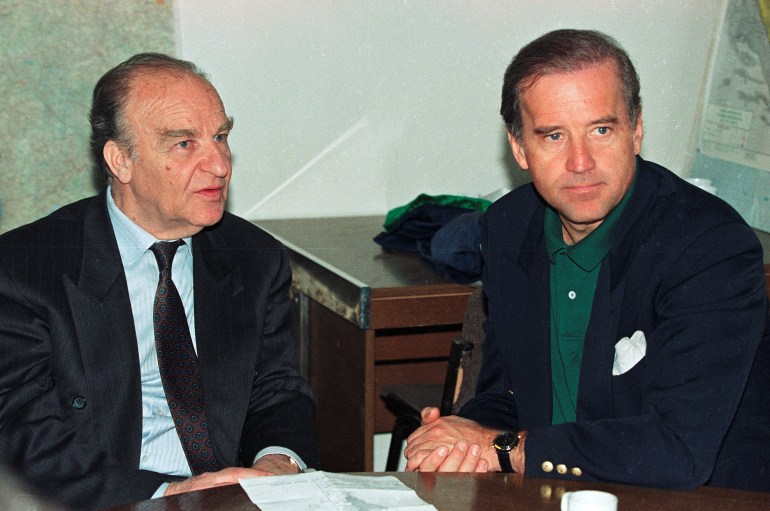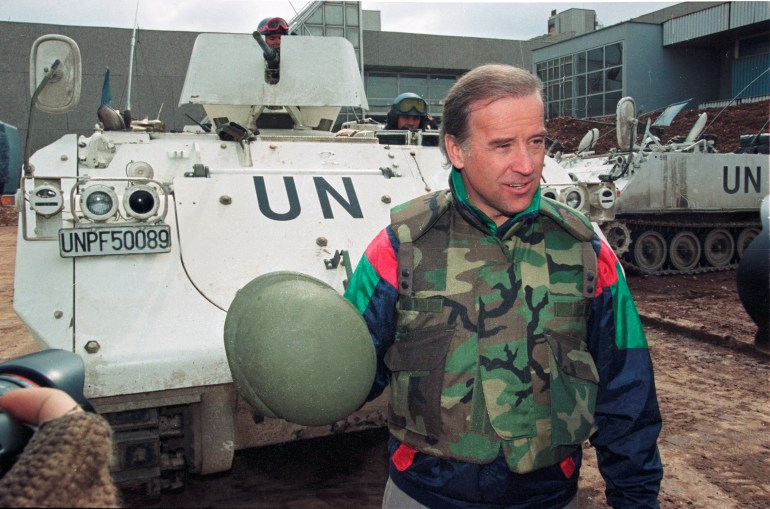Why Biden’s victory may present an ‘opportunity’ for Bosnia
In the 90s, then-Senator Biden played a key role in attempting to lift the arms embargo and called for US intervention to end the violence.

Following the announcement of Joe Biden’s projected win, the US flag was raised outside of Sarajevo’s national library, along with an iconic image from nearly three decades ago – the Democrat sitting alongside Bosnia’s first president, Alija Izetbegovic, in besieged Sarajevo.
“Bosnia Remembers,” it read at the top. “Unity over division.”
Keep reading
list of 4 items‘Butcher of Bosnia’ Mladic unfit for genocide appeal: Lawyers
Bosnian Serb official convicted of war crimes dies of COVID-19
Today’s America reminds me of 1990s Bosnia and Herzegovina
Bosnia’s Foreign Minister Bisera Turkovic was among the first foreign leaders to congratulate Biden on his victory, saying a “new dawn is upon us”.
Dear Joe, we kept the faith, now the new dawn is upon us.
🇧🇦 ❤️ 🇺🇸 @JoeBiden pic.twitter.com/AycrM9wSRk— Bisera Turković (@BiseraTurkovic) November 7, 2020
For many Bosnians, a Biden presidency could also mean the start of a new chapter for Bosnia, 25 years since the US-brokered Dayton peace agreement was signed, ending the brutal war in Bosnia.
From April 1992 until December 1995, Bosnia was under attack by both Serb and Croat forces aiming to carve the country up into a Greater Serbia and a Greater Croatia, respectively.
The UN and NATO imposed an arms embargo from the start, but as the attacking forces were already heavily armed, the embargo was a huge disadvantage only for the defenceless Bosnians, who were caught entirely unprepared at the outbreak of war.
At the time, Senator Biden played a key role in attempting to lift the arms embargo and actively called for US intervention to end the genocide and ethnic cleansing of Bosnia’s non-Serb population.
For those besieged in Bosnia at the time, his support was deeply felt, especially as some in the international community backed partitioning the country which has a large Muslim population.

With massacres unfolding across Bosnia culminating in a genocide in Srebrenica in July 1995, British officials had spoken of a “painful but realistic” restoration of Christian Europe, which was revealed in recorded sessions with President Bill Clinton some 15 years later.
Biden was a key player in getting the US and NATO to intervene, which eventually led to the November 1995 peace agreement, drafted at an airbase in Dayton, Ohio.
Ismail Cidic, president of the Bosnian Advocacy Centre told Al Jazeera that Biden’s win presents a “potential opportunity” for Bosnia.
“Even though he was a Democrat, he consistently opposed Clinton for keeping the arms embargo on Bosnia. It’s safe to say that currently there is no world leader that has a better understanding of past, as well as recent, events in the Balkan region and, in particular, in Bosnia,” Cidic said.
For Reuf Bajrovic, co-chair of the US-Europe Alliance organisation, Biden’s victory “is impossible to overestimate in terms of Bosnia’s trajectory”.
“Bosnia’s system of governance depends on the OHR (Office of High Representative) – which is directly dependent on US support,” Bajrovic told Al Jazeera.
“The Biden administration can make a very big difference in Bosnia precisely because the Dayton Peace Agreement has built-in mechanisms for successful US involvement.
“US political will was the key missing ingredient. Biden should provide plenty of that,” Bajrovic said.

‘Steadfast support of the US’
Political instability has followed the noticeable withdrawal of US and EU policy from the region over the years.
During his election campaign, Biden reaffirmed his commitment to Bosnia and Kosovo.
“Joe Biden knows that for Bosnia and Herzegovina to succeed, it will need the steadfast support of the United States,” the statement published in October read.
“Unfortunately, under President Trump, US influence in the region has faded as the administration has cast the European Union as a strategic adversary and questioned the value of the NATO alliance.
“Joe Biden commits to always stand against hate and supports Bosnia and Herzegovina’s sovereignty, territorial integrity and multi-ethnic character.”
The last sentence is believed to allude to a renewed push by Serb and Croat nationalists for further division and secession in Bosnia, which has resurfaced in the news.
As advocates of ethnic boundaries found an audience with the Trump administration and affiliates, talk of redrawing Kosovo’s borders, and of Republika Srpska, Bosnia’s Serb-run entity, seceding, were being taken seriously for the first time.

Bosnia is considered to be the new “battleground” between NATO and Russia, with analysts warning that Russia has been undermining Bosnia’s stability through local proxies to keep the country out of NATO.
Cidic of the Bosnian Advocacy Centre said that in order to position itself higher on Biden’s agenda, Bosnian foreign policy must be “more assertive … to capitalise on the new administration”.
Bolstering stronger US support is needed for reforms in Bosnia, he said, to support the country’s path towards joining NATO.
Ajla Delkic, head of the Advisory Council for Bosnia and Herzegovina based in Washington, DC told Al Jazeera that while the US has sent a clear message that it supports Bosnia’s sovereignty and territorial integrity, “it is up to pro-Bosnian leaders in Bosnia to ensure that it stays that way”.
“I believe [Biden’s] administration will be more actively engaged, however, it truly is up to Bosnia to lift up its sleeves and get to work. Joe Biden will not rid Bosnia of corruption, nor will he fix Bosnia’s healthcare system, education system or eradicate the system of patronage that is bleeding the country dry,” Delkic said.
“Democracy is not a spectator sport and the citizens of Bosnia have an opportunity to show that they want change in the upcoming [local] elections [on November 15].”
Dayton, in need of reform
The Dayton peace accord was created to end the war, but its complex system of governance and power-sharing between ethnic groups was not meant as a permanent, lasting solution.
“Despite Dayton’s enormous success, it enabled a certain level of dysfunction,” Delkic said, and now, 25 years on, may be the time to address some of the challenges so the country can move forward.
“Bosnia has a unique opportunity in the next four years of the Biden presidency to garner political will and come together in order to reform Dayton.”
“Will that happen? Time will tell, but it will take the will of the people to demand that of their elected representatives.”